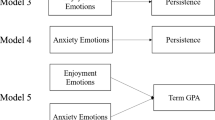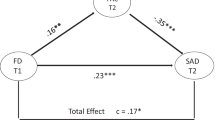Abstract
This study used latent transition analysis (LTA) to examine stability and change in the emotion profiles of university students during a two-semester course. Three positive emotions (i.e., hope, pride, and happiness) and five negative emotions (i.e., guilt, helplessness, anger, shame, and regret) derived from Weiner’s attribution theory of emotion (1985, 2007, 2018a, 2018b) were used to identify the emotion profiles of university students at the beginning (Time 1) and end (Time 2) of a two-semester course. We also examined changes in emotion profile memberships over time. Results showed 81% of participants remained in their Time 1 profiles at Time 2, with the majority classified in profiles defined by stable positive emotions or mixed emotions. ANCOVAs indicated that students in the stable positive emotion profile achieved better overall course performance than those with a stable mixed profile or a stable negative emotion profile. An ascending emotion transition profile (Time 1 mixed-to-Time 2 positive) performed better than a stable mixed emotion profile. The present findings extend our current understanding of multifaceted profiles of student emotion that can change over time.



Similar content being viewed by others
Data Availability
Students in our study did not consent to the data being made publicly available. In addition, the data also contain confidential student records.
Notes
There were multiple categories for students to enroll in undergraduate programs, in addition to direct entry from high school. In light of this, we asked students to self-report their overall percentage in their last year of high school and used this as a control variable to account for prior academic performance on their Introductory Psychology course. Students reported a wide range of possible high school GPAs, including less than 60%
Three participants had invalid scores on academic measures and hence they were not included in the ANCOVA.
References
Anttila, H., Pyhältö, K., Soini, T., & Pietarinen, J. (2017). From anxiety to enthusiasm: Emotional patterns among student teachers. European Journal of Teacher Education, 40(4), 447–464. https://doi.org/10.1080/02619768.2017.1349095.
Asparouhov, T., & Muthén, B. (2015). Residual associations in latent class and latent transition analysis. Structural Equation Modeling: A Multidisciplinary Journal, 22(2), 169–177. https://doi.org/10.1080/10705511.2014.935844.
Baker, R. S., D’Mello, S. K., Rodrigo, M. M. T., & Craesser, A. C. (2014). Better to be frustrated than bored: The incidence, persistence, and impact of learners’ cognitive-affective states during interactions with three different computer-based learning environments. International Journal of Human-Computer Studies, 68, 223–241. https://doi.org/10.1016/j.ijhcs.2009.12.003.
Bang, K., & Goodyear, R. K. (2014). South Korean supervisees’ experience of and response to negative supervision events. Counselling Psychology Quarterly, 27, 353–378. https://doi.org/10.1080/09515070.2014.940851.
Bauer, D. J., & Curran, P. J. (2003). Distributional assumptions of growth mixture models: Implications for overextraction of latent trajectory classes. Psychological Methods, 8, 338–363. https://doi.org/10.1037/1082-989X.8.3.338.
Clark, S. L. (2010). Mixture modeling with behavioral data. Doctoral dissertation, University of California, Los Angeles, CA. Retrieved from https://www.statmodel.com/download/Dissertation_v1.pdf
Daniels, L. M., & Gierl, M. (2017). The impact of immediate test score reporting on university students’ achievement emotions in the context of computer-based multiple-choice exams. Learning and Instruction, 52, 27–35.
Denovan, A., & Macaskill, A. (2017). Stress and subjective well-being among first year UK undergraduate students. Journal of Happiness Studies, 18, 505–525.
Denovan, A., Dagnall, N., Macaskill, A., & Papageorgiou, K. (2020). Future time perspective, positive emotions, and student engagement: A longitudinal study. Studies in Higher Education, 45, 1533–1546.
Divecha, D., & Stern, R. (2016). Why college freshmen need to take emotions 101. In T. J. Pierce (Ed.), College: A reader for writers. Oxford University Press.
Ekman, P. (1999). Basic emotions. In T. Dalgleish & M. Power (Eds.), Handbook of cognition and emotion (pp. 45–60). John Wiley & Sons. Ltd..
Fredricks, J. A., Blumenfeld, P. C., & Paris, A. H. (2004). School engagement: Potential of the concept, state of the evidence. Review of Educational Research, 74(1), 59–109.
Fredrickson, B. L., & Joiner, T. (2002). Positive emotions trigger upward spirals toward emotional well-being. Psychology Science, 13(2), 172–175.
Frijda, N. H. (1986). The emotions. Cambridge, UK: Cambridge University Press.
Giannakos, M. N. (2013). Enjoy and learn with educational games: Examining factors affecting learning performance. Computers and Education, 68, 429–439. https://doi.org/10.1016/j.compedu.2013.06.005.
Gillet, N., Morin, A. J. S., & Reeve, J. (2017). Stability, change and implications of students’ motivation profiles: A latent transition analysis. Contemporary Educational Psychology, 51, 222–239. https://doi.org/10.1016/j.cedpsych.2017.08.006.
Hareli, S., & Weiner, B. (2002). Social emotions and personality inferences: A scaffold for a new direction in the study of achievement motivation. Educational Psychologist, 37(3), 183–193. https://doi.org/10.1207/S15326985EP3703_4.
Helmich, E., Bolhuis, S., Prins, J., Laan, R., & Koopmans, R. (2011). Emotional learning of undergraduate medical students in an early nursing attachment in a hospital or nursing home. Medical Teacher, 33(11), 593–601.
Hou, T., & Cheng, K. (2012). Analyzing the latent emotional transfer pattern (LETP) of a learning community in an online peer-assessment activity. British Journal of Educational Technology, 43(4), E113–E116. https://doi.org/10.1111/j.1467-8535.2012.01301.x.
Jarrell, A., Harely, J. M., & Lajoie, S. P. (2016). The link between achievement emotions, appraisals, and task performance: Pedagogical considerations for emotions in CBLEs. Journal of Computer Education, 3(3), 289–307.
Jarrell, A., Harley, J. M., Lajoie, S. P., & Naismith, L. (2017). Success, failure, and emotions: Examining the relationship between performance feedback and emotions in diagnostic reasoning. Education Technology Research Development, 65, 1263–1284.
Jung, T., & Wickrama, K. A. S. (2008). An introduction to latent class growth analysis and growth mixture modeling. Social and Personality Psychology Compass, 2(1), 302–317. https://doi.org/10.1111/j.1751-9004.2007.00054.x.
Kidwell, K. S. (2005). Understanding the college first-year experience. Retrieved from: http://www.ecu.edu/cs-studentaffairs/saprofessionaldevelopment/customcf/Understanding%20the%20First%20Year%20College%20Experience%20by%20Kirk%20S.%20Kidwell.pdf
Kim, C. M., Park, S. W., & Cozart, J. (2014). Affective and motivational factors of learning in online mathematics courses. British Journal of Educational Technology, 45(1), 171–185. https://doi.org/10.1111/j.1467-8535.2012.01382.x.
Koenka, A. C. (2020). Academic motivation theories revisited: An interactive dialog between motivation scholars on recent contribution, underexplored issues, and future directions. Contemporary Educational Psychology., 61, 101831. https://doi.org/10.1016/j.cedpsych.2019.101831.
Larsen, J. T., Coles, N. A., & Jordan, D. K. (2017). Varieties of mixed emotional experience. Current Opinion in Behavioral Sciences, 17, 72–76. https://doi.org/10.1016/j.cobeha.2017.05.021.
Lazarus, R. S. (1991). Emotions and adaptation. New York: Oxford University Press.
Lindström, U. H., Hamberg, K., & Johansson, E. V. (2011). Medical students’ experiences of shame in professional enculturation. Medical Education, 45, 1016–1024. https://doi.org/10.1111/j.1365-2923.2011.04022.x.
Lo, Y., Mendell, N. R., & Rubin, D. B. (2001). Testing the number of components in a normal mixture. Biometrika, 88, 767–778. https://doi.org/10.1093/biomet/88.3.767.
Marsh, H. W., Lüdtke, O., Trautwein, U., & Morin, A. J. S. (2009). Classical latent profile analysis of academic self-concept dimensions: Synergy of person- and variable-centered approaches to theoretical models of self-concept. Structural Equation Modeling, 16, 191–225. https://doi.org/10.1080/10705510902751010.
Morosanu, L., Handley, K., & O’Donovan, B. (2010). Seeking support: Researching first-year students’ experiences of coping with academic life. Higher Education Research & Development, 29(6), 665–678. https://doi.org/10.1080/07294360.2010.487200.
Muthén, B. (2003). Statistical and substantive checking in growth mixture modeling: Comment on Bauer and Curran (2003). Psychological Methods, 8, 369–377. https://doi.org/10.1037/1082-989X.8.3.369.
Muthén, L. K., & Muthén, B. O. (1998-2018). Mplus User's Guide (Eighth ed.). Los Angeles: Muthén & Muthén.
Nylund, K. L., Asparouhov, T., & Muthén, B. O. (2007). Deciding on the number of classes in latent class analysis and growth mixture modeling: A Mote Carlo simulation study. Structural Education Modeling: A Multidisciplinary Journal, 14(4), 535–569. https://doi.org/10.1080/10705510701575396.
Pekrun, R. (2006). The control-value theory of achievement emotions: Assumptions, corollaries, and implication for educational research and practice. Educational Psychology Review, 18(4), 315–341. https://doi.org/10.1007/s10648-006-9029-9.
Pekrun, R., Goetz, T., Titz, W., & Perry, R. P. (2002). Academic emotions in students’ self-regulated learning and achievement: A program of qualitative and quantitative research. Educational Psychologist, 37(2), 91–105. https://doi.org/10.1207/S15326985EP3702_4.
Pekrun, R., Elliot, A. J., & Maier, M. A. (2009). Achievement goals and achievement emotions: Testing a model of their joint relations with academic performance. Journal of Educational Psychology, 101(1), 115–135. https://doi.org/10.1037/a0013383.
Pekrun, R., Goetz, T., Frenzel, A. C., Barchfeld, P., & Perry, R. P. (2011). Measuring emotions in students’ learning and performance: The Achievement Emotions Questionnaire (AEQ). Contemporary Educational Psychology, 36, 35–48. https://doi.org/10.1016/j.cedpsych.2010.10.002.
Pekrun, R., & Linnenbrink-Garcia, L. (2012). Academic emotions and student engagement. In S. L. Christenson, A. L. Reschly, & C. Wylie (Eds.), Handbook of research on student engagement (p. 259–282). Springer Science + Business Media. https://doi.org/10.1007/978-1-4614-2018-7_12
Pekrun, R., Litchenfeld, S., Marsh, H. W., Murayama, K., & Goetz, T. (2017). Achievement emotions and academic performance: Longitudinal models of reciprocal effects. Child Development, 88(5), 1653–1670. https://doi.org/10.1111/cdev.12704.
Posner, J., Russell, J. A., & Peterson, B. S. (2005). The circumplex model of affect: An integrative approach to affective neuroscience, cognitive development, and psychopathology. Development and Psychopathology, 17(3), 715–734.
Robinson, K. A., Ranellucci, J., Lee, Y., Wormington, S. V., Roseth, C. J., & Linnenbrink-Garcia, L. (2017). Affective profiles and academic success in a college science course. Contemporary Educational Psychology, 51, 209–221. https://doi.org/10.1016/j.cedpsych.2017.08.004.
Rowe, A. D., Fitness, J., & Wood, L. M. (2015). University student and lecture perceptions of positive emotions in learning. International Journal of Qualitative Studies in Education, 28, 1–20. https://doi.org/10.1080/09518398.2013.847506.
Satterfield, J. M., Monahan, J., & Seligman, M. E. P. (1998). Law school performance predicted by explanatory style. Behavioral Sciences & the Law, 15, 95–105. https://doi.org/10.1002/(SICI)1099-0798(199724)15:1<95::AID-BSL255>3.0.CO;2-Y.
Snyder, C. R., Shorey, H. S., Cheavens, J., Pulvers, K. M., Adams III, V. H., & Wiklund, C. (2002). Hope and academic success in college. Journal of Educational Psychology, 94(4), 820–826. https://doi.org/10.1037//0022-0663.94.4.820.
Stoltzfus K. (2015). Students who feel emotionally unprepared for college struggle in the classroom. The Chronicle of Higher Education. Retrieved from https://www.chronicle.com/article/Students-Who-Feel-Emotionally/233684
Tze, V. M. C., Daniels, L. M., Buhr, E., & Le, L. (2017). Affective Profiles in a Massive Open Online Course and their Relationship with Engagement. Frontiers in Education. https://doi.org/10.3389/feduc.2017.00065
Velicer, W. F., Martin, R. A., & Collins, L. M. (1996). Latent transition analysis for longitudinal data. Addiction, 91(Supplement), S197–S209.
Villavicencio, F. T., & Bernardo, A. B. I. (2013). Positive academic emotions moderate the relationship between self-regulation and academic achievement. British Journal of Educational Psychology, 83(2), 329–340. https://doi.org/10.1111/j.2044-8279.2012.02064.x.
Watson, D., & Stanton, K. (2017). Emotion blends and mixed emotions in the hierarchical structure of affect. Emotion Review, 9(2), 99–104.
Weiner, B. (1979). A theory of motivation for some classroom experiences. Journal of Educational Psychology, 71(1), 3–25. https://doi.org/10.1037/0022-0663.71.1.3.
Weiner, B. (1985). An attributional theory of achievement motivation and emotion. Psychological Review, 92(4), 548–573.
Weiner, B. (2007). Examining emotional diversity in the classroom: An attribution theorist considers the moral emotions. In P. A. Schutz & R. Pekrun (Eds.), Educational psychology series. Emotion in education (pp. 75-88). https://doi.org/10.1016/B978-012372545-5/50006-X.
Weiner, B. (2014). The attribution approach to emotion and motivation: History, hypotheses, home runs, headaches/heartaches. Emotion Review, 6(4), 353–361.
Weiner, B. (2018a). A further visit to the no-crisis zone. Motivation Science, 4(1), 24–25. https://doi.org/10.1037/mot0000100.
Weiner, B. (2018b). The legacy of an attribution approach to motivation and emotion: A non-crisis zone. Motivation Science, 4, 4–14. https://doi.org/10.1037/mot0000082.
You, J. W., & Kang, M. (2014). The role of academic emotions in the relationship between perceived academic control and self-regulated learning in online learning. Computers and Education, 77, 125–133. https://doi.org/10.1016/j.compedu.2014.04.018.
Zhao, Y., & Karypic, G. (2004). Empirical and theoretical comparisons of selected criterion functions for document clustering. Machine Learning, 55, 311–333.
Funding
This research was supported by an award to Raymond P. Perry from the Social Sciences and Humanities Research Council of Canada (SSHRC) Insight program (435–2017-0804) and the Royal Society of Canada.
Author information
Authors and Affiliations
Corresponding author
Ethics declarations
Conflict of Interest
The authors declare that they have no conflict of interest. The research procedures have adhered to the Declaration of Helsinki and received approval from the University Research Ethics Board. Informed consent was obtained from all individual participants included in the studies.
Additional information
Publisher’s Note
Springer Nature remains neutral with regard to jurisdictional claims in published maps and institutional affiliations.
Electronic supplementary material
ESM 1
(DOCX 25 kb)
Rights and permissions
About this article
Cite this article
Tze, V.M.C., Daniels, L.M., Hamm, J.M. et al. Stability and change in the achievement emotion profiles of university students. Curr Psychol 41, 6363–6374 (2022). https://doi.org/10.1007/s12144-020-01133-0
Accepted:
Published:
Issue Date:
DOI: https://doi.org/10.1007/s12144-020-01133-0




